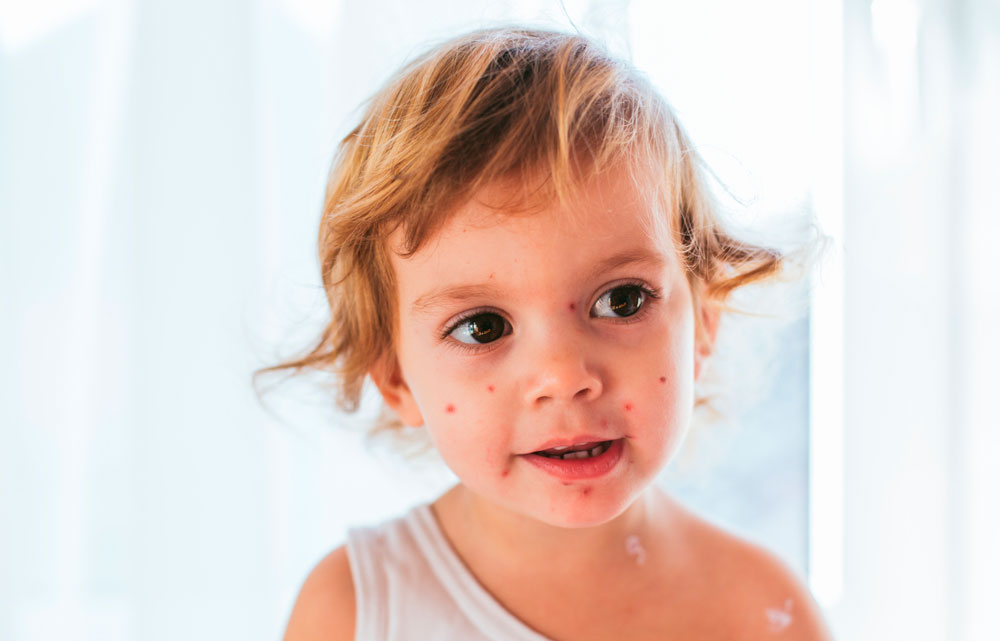Do you know that there are 4 million cases of chickenpox every year? Research shows that chickenpox causes 10,600 hospitalizations and approximately 150 deaths per year. In Pakistan, most people believe that everyone will always have chickenpox once in a lifetime. This makes people wonder, is it possible to prevent chickenpox through vaccination.
Chickenpox is an infection caused by the varicella-zoster virus. Newborns, infants, and younger kids are at a very high risk of catching chickenpox. Chickenpox is a highly contagious condition which means it can spread from one person to another. Chickenpox is normally a mild disease. But it can lead to serious complications like bacterial infections of the skin, dehydration, pneumonia, and Reye’s syndrome. Following is a guide by Dr. Junaid Jahangir about the possible prevention, vaccination, treatment, and care for chickenpox in Pakistan.
Symptoms And Causes Of Chickenpox In Pakistan
To understand the prevention of chickenpox, we must know what causes chickenpox and how to diagnose chickenpox in children. Chickenpox is primarily caused by direct contact with someone already carrying the varicella-zoster virus. It can also be caused when an infected person coughs or sneezes and you inhale the contaminated air droplets.
There is an itchy, blister rash in chickenpox illness that appears 10 to 21 days after exposure to the virus. It usually lasts about five to 10 days. There are three phases of chickenpox rash:
Papules: These are raised pink or red bumps.
Vesicles: Those bumps turn into small fluid-filled blisters.
Crusts and scabs: The blisters break, leak, and then get covered to heal in several days.
The virus remains contagious until all broken blisters have crusted over. In severe cases, the rash can cover the entire body, and lesions may form in the throat, eyes, and mucous membranes of the genitals
There are other signs and symptoms, which may appear 1 to 2 days before the rash. Some of them are:
- Fever
- Loss of appetite
- Headache
- Tiredness and a general feeling of being unwell
Chickenpox Vaccination And Prevention In Pakistan
Vaccination is the best and intelligent way of preventing chickenpox before it occurs or shows symptoms. Research shows that two doses of vaccination can be 90% effective against chickenpox. Chickenpox vaccination is also important to gain herd immunity and to protect vulnerable people. Normally, chickenpox vaccination is always included in the mandatory vaccination schedule. The first dose of chickenpox vaccination is given at 12-15 months of age. The second dose of vaccination is given at least 3 months after the first dose.
There is a slight chance that people who are vaccinated or already had chickenpox once can still catch the disease. In case of an outbreak of chickenpox, you should develop good hygiene and healthy habits. Wash hands frequently and limits physical exposure with people. Try to stay away from people already sick from chickenpox and sanitize the surfaces that might be contaminated. Isolate the child suffering from chickenpox to prevent the symptoms in other children.
How To Care For Children With Chickenpox?
Dealing with this messy, itchy, and unpleasant condition is not easy. Parents often get anxious seeing the condition of their little one. There are certain measures you can take to help your child with chickenpox. Following are some tips, do’s, and don’ts that help in caring for children with chickenpox.
- First of all, make sure your child is staying home and completely isolated from other kids. Make sure to separate dishes, cups, clothes, toys, and other everyday use items.
- If there is a fever try to relieve it with non-aspirin medications. The use of aspirin medications in children with chickenpox can severely affect the liver and brain. Avoid medications such as acetaminophen or ibuprofen.
- Relieve the itching by using calamine lotion and colloidal oatmeal baths. Scratching the blisters can lead to chickenpox scars. Consult a pediatrician near you and ask for a prescription of syrups and tablets that relieve itching.
- Children with chickenpox usually have a hard time sleeping. Apply cooling cream or gel before bed and help them to have a restful night. Make sure the bedding is soft and not too hot.
- Keep your child hyderated and give a nutrient-rich diet to build strong immunity.
- Make sure the clothes are loose, cool, soft materials such as smooth cotton.
Make sure to consult a pediatrician near you if your child is showing the symptoms of chickenpox. The child specialist can diagnose and prescribe the best treatment for chickenpox. Moreover, the doctor can also tell you the diet plan and care routine to ease out the condition. Remember that prevention is always better than treatment.
